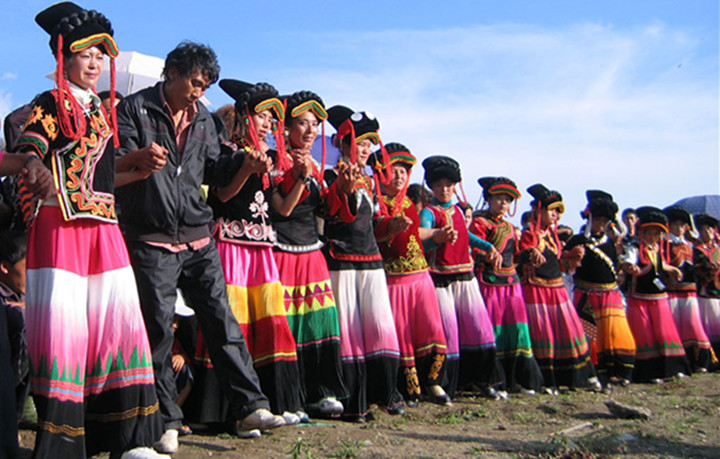

The Yi nationality is one of the minority nationalities in China, and it has over 6.57 million people. It mainly distributes over Yunnan, Guizhou, Sichuan province and the Northwestern part of Guangxi Zhuang Autonomous Region. The gathering regions of Yis are: the Liangshan Yi Autonomous Prefecture of Sichuan, the Honghe Hani and Yi Autonomous Prefecture, The Chuxiong Yi Autonomous Prefecture, counties like Lunan, Nanjian, Eshan, Yanbi, Ninglang, Bijie and Liupanshui region in Guizhou and Longlin Autonomous County for different nationalities in Guangxi.
The Yis scatter very widely and they are divided into many branches, so there are many different names in history called by themselves and other nationalities, such as "Nousu", "Nasu", "Niesu", "Axi", "Sani", etc. After the new China was founded, they were unitedly called "Yi" according to their own will.
The Yis have their own language and character. The Yi language belongs to the Yi language branch of the Tibetan-Burmese family in the Sino-Tibetan Family, which is divided into six dialects: the eastern dialect, the western dialect, the southern dialect, the northern dialect, the middle dialect and the southeastern dialect. There is big difference among these dialects. The Yi character is a kind of syllabic character, and it was called "Cuan writing", "Wei writing", "Luo writing", "Luoluo writing" in Chinese historic records. More than 2000 words are in common use. It is usually written from the left to the right. "The Southwestern Yi Records" is a famous book written in Yi characters.
Agriculture is main economy for Yis, and people in some places are engaged in animal husbandry concurrently. Main crops are corn, buckwheat, potato, wheat, paddy, etc.
Their clothes and adornments are varied in different places and have a great variety. Men mostly wear black clothes with narrow sleeve and wide front and long trousers with very large legs. Women often wear garment with wide front and long pleated skirt. Men and women, young and old, all like to wear "Ca'erwa" (a kind of cloak make of wool) and felt cloak. There are different kinds of traditional houses for them: Chacha house (make of tree branches), shack, wooden Luoluo, Waban house (covered with board tile), Tuzhang house (built with mud and wood which has flat roof), etc. The Yis believe in primitive religion and worship polytheism. There are many festivals, such as the Yi New Year, Torch Festival, New Rice Festival, Flower Inserting Festival, Bullfight Festival, Dress competition Festival, etc.
The Yis believe in primitive religion and worship polytheism. There are many festivals, such as the Yi New Year, Torch Festival, New Rice Festival, Flower Inserting Festival, Bullfight Festival, Dress competition Festival, etc.
The Yis have very long history and flourishing culture. Their music, song and dance, and arts and crafts are bright, gorgeous and full of national features.
You will only receive emails that you permitted upon submission and your email address will never be shared with any third parties without your express permission.
